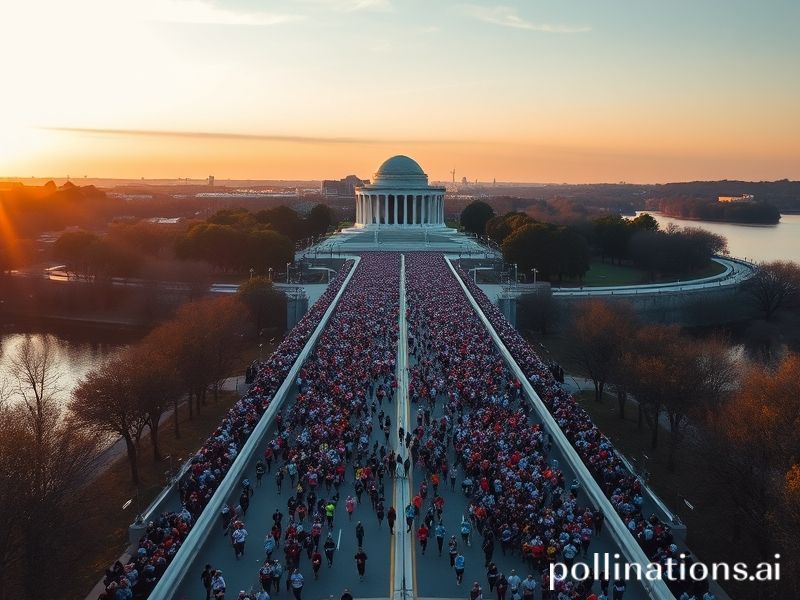Global Perspiration: Inside the DC Half Marathon as a Microcosm of World Order
Washington, D.C.—On a humid Sunday that felt imported straight from the Mekong Delta, 20,000 pairs of overpriced carbon-plated sneakers slapped the asphalt from the Capitol to Hains Point and back. The DC Half Marathon, an event whose very name is a polite fiction (the advertised 13.1 miles somehow always measures closer to 13.4—clearly the same cartographers who drew post-colonial borders had a hand in the course), has become an unlikely barometer for the planet’s emotional weather.
From an international vantage—say, a rooftop bar in Lisbon watching the livestream between sips of over-iced vinho verde—the spectacle looks less like sport and more like a UN summit on endorphins. Kenyans, Japanese investment bankers, Brazilian diplomats, and a surprisingly large delegation of Belgians (who swear they’re only here for the beer at the finish) all queue for the same porta-potty. Globalization has many faces; some wear neon compression socks.
Security, naturally, is tighter than a Moscow election. The Secret Service, Capitol Police, and what appear to be three separate SWAT teams eye every Gu packet like it might detonate. Meanwhile, a lone tourist from Naples tries to explain to a bewildered officer that his grandfather’s metal hip always sets off alarms, a conversation that ends with a bilingual pat-down and a shared sigh about the human condition.
The course itself is a greatest-hits album of American contradictions. Runners glide past the Jefferson Memorial—where the third president’s ghost presumably winces at the $200 entry fee—then through gentrified Navy Yard, where condos sell for sums that could refinance Greece. Aid stations hand out not just water but electrolytes, existential dread, and small-batch granola sourced from a farm you’ve never heard of but already resent.
Back home in Berlin, a friend texts that the race’s carbon footprint is trending on German Twitter next to photos of the Rhine drying up. He calculates the emissions of 20,000 people flying in to run in circles, then adds a shrug emoji—the universal symbol for late-stage capitalism. I reply with a picture of the finishers’ medal: a three-inch slab of zinc alloy designed to commemorate our collective refusal to stay still even when we clearly should.
Yet the event’s broader significance reveals itself in the small data points. GPS watches ping satellites operated by the same U.S. Space Force that may or may not be tracking your Strava heat map for future drone targeting. Kenyan pacers lead at 5:20 per mile, inadvertently exporting Rift Valley oxygen efficiency to lobbyists who still can’t climb the Metro escalator without wheezing. A Chinese state-media crew films the whole thing for a soft-power segment titled “Look, Americans Also Sweat for No Reason.”
By mile ten, the course entertainment includes a high-school mariachi band, a lone didgeridoo player who swears he’s Australian, and a pop-up yoga stretch zone sponsored by a cryptocurrency that collapsed mid-race. The juxtaposition is so on-the-nose it could’ve been scripted by a depressed algorithm. Runners high-five toddlers waving flags from countries whose names they can’t pronounce but whose oil they definitely use.
At the finish, medals clink like loose change in the global till. Someone hands me a banana stickered with a QR code linking to a climate-offset microtransaction site. I scan it; the site is down, presumably hacked by a teenager in Jakarta who just wanted to watch the world jog. A Belgian offers me a lukewarm Stella; we toast to the absurdity of paying to suffer in public while the world burns politely in the background.
Later, as I ice my knees in the hotel bathtub, the BBC reports that this year’s field represented 73 countries and every major geopolitical tension. Somewhere in Tehran, a state news anchor calls the race “a decadent Western pilgrimage to the temple of self.” Fair enough, but temples—like democracies—require upkeep. And so we’ll be back next year, lacing up again, proving that if nothing else, humans are reliably ridiculous on a global scale.







